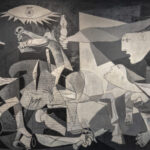Artist Interview: Caribbean Crisis
Posted: by The Alt Editing Staff

When I moved to Albany in 2017, one of the first local bands I experienced was the four piece Russian punk group, Caribbean Crisis. The set was full of energy, and the band’s unique instrumentation drew me up from the back of the bar where I was sitting. After the initial performance, I could tell this was a band whose content had a statement, but who prioritized having fun live.
Before the release of their new EP, “Last Delight”, I had a chance to talk with the band about the cultural influences that permeate the songwriting, each member’s personal investment in the album, and the symbolism behind the name, Caribbean Crisis. Consisting of three women and one man, the members believe that the gender and cultural diversity in their lineup works in their favor, as it garners curiosity among the audience. The group agrees that, “The craft and our personalities is what matters.”
Guitarist/Vocalist, Victor Dmitriev, came to America a few years ago from Russia to study at Saint Rose, and was smitten with American punk rock. He sought to blend this punk style with an even more familiar one: Russian folk. When I asked Dmitriev what influence his Russian heritage had on the songs, he told me, “I’m inspired by American punk, like Rise Against!, and I wanted my band to be able to use that base to overlay traditional Russian melody and instrumentation. That’s why we have a flutist, and occasionally use a balalaika.”
He also said that much of Russian radio play is public domain, and the DIY spirit he sees in American musicians is not as prevalent there. “Here, there is more original content, and it is a more communal environment for songwriting. Much of the problem with the music industry is a lack of cultural combinations. Caribbean Crisis works against that separation of Russian and American culture, popularized by the Cold War, and creates something better together.”
I asked the rest of the band about their own contributions to the work, and how they incorporate their musical histories and cultures into it. “I grew up on classic rock. That big, bouncing energy of musicians like Mike “Flea” Balzary (RHCP) is something I try to bring to the group,” bassist Ana Carolina Peronico said. The group’s flutist, Daniela Chavarria, said, “I was trained as a classical flutist, and listened to a lot of composers and the like. However, I had my dip into ‘rebellious’ music, too! I find that the innovation of Caribbean Crisis comes from the inclusion of classical elements into an unorthodox punk style of music.” Drrummer Tia Malai Mathison told me “I started drumming in a stereotypical, school-based learning setting. There’s the occasional alt rock/metal stuff, but working with a genre that’s against your training can be a rewarding challenge, ”
We also briefly discussed the origin of the band’s name, and what their overall statement as musicians is. “The name, Carribbean Crisis, is ironic. The symbolism lies in the positive, intercultural unison that we as a band create, because it’s contrary to the connotation of the name,” Dmitriev said. “The original Caribbbean Crisis was the Cuban Missile Crisis, and it came about because of the hostilities between America and the then Soviet Union, all influenced by a separation of culture. We aim to avoid conflict like this by finding a common ground where cultures can appreciate each other, and we’ve found that in music.”
Caribbean Crisis’s new EP, “Last Delight,” is available to stream everywhere now. Go give it a listen, and immerse yourself in what might be an unfamiliar sound, but one that will definitely get you moving.
—
Luciano Ferrara | @LucianoRFerrara
The Alternative is ad-free and 100% supported by our readers. If you’d like to help us produce more content and promote more great new music, please consider donating to our Patreon page, which also allows you to receive sweet perks like free albums and The Alternative merch.










